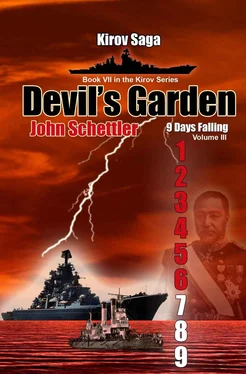John Schettler - Devil's Garden
Здесь есть возможность читать онлайн «John Schettler - Devil's Garden» весь текст электронной книги совершенно бесплатно (целиком полную версию без сокращений). В некоторых случаях можно слушать аудио, скачать через торрент в формате fb2 и присутствует краткое содержание. Жанр: Альтернативная история, на английском языке. Описание произведения, (предисловие) а так же отзывы посетителей доступны на портале библиотеки ЛибКат.
- Название:Devil's Garden
- Автор:
- Жанр:
- Год:неизвестен
- ISBN:нет данных
- Рейтинг книги:3 / 5. Голосов: 1
-
Избранное:Добавить в избранное
- Отзывы:
-
Ваша оценка:
- 60
- 1
- 2
- 3
- 4
- 5
Devil's Garden: краткое содержание, описание и аннотация
Предлагаем к чтению аннотацию, описание, краткое содержание или предисловие (зависит от того, что написал сам автор книги «Devil's Garden»). Если вы не нашли необходимую информацию о книге — напишите в комментариях, мы постараемся отыскать её.
Devil's Garden — читать онлайн бесплатно полную книгу (весь текст) целиком
Ниже представлен текст книги, разбитый по страницам. Система сохранения места последней прочитанной страницы, позволяет с удобством читать онлайн бесплатно книгу «Devil's Garden», без необходимости каждый раз заново искать на чём Вы остановились. Поставьте закладку, и сможете в любой момент перейти на страницу, на которой закончили чтение.
Интервал:
Закладка:
Nikolin’s signal was sent, but the steamship Captain continued his protest, stating that any boarding would be illegal under international law and he was well within his rights to prevent it.
“Prevent it?” Karpov smiled. “I believe this man needs a little lesson or two. Mister Samsonov, if you please.”
“Captain?”
“Forward bow gun, as before with the Japanese tramp steamer. Give them a shot across the bow.”
“Aye, sir.” Karpov watched the deck gun quickly rotate to bear on the target with a single sharp recoil as the round was sent on its way. Then they waited, and the protest coming now from the Monteagle was ever more strident.
“Sir,” said Nikolin. “They now threaten to file a formal protest with the Russian government and state our conduct amounts to piracy and is outrageous.”
“Outrageous? My, what a colorful man. One more round, Mister Samsonov. I want you to hit the aft quarter of the ship if possible. Aim for that solitary smokestack.” Then to Nikolin he said: “Let them know we will disable their engines if they fail to cooperate.”
The sound of the gun was sharp in the air again, and the round hit home with a bright flash. It ignited a fire aft and Karpov laughed as he looked through his field glasses seeing how the other ship’s crew scrambled to put out the flames.
“Ask that upstart sea Captain if he wants me to repeat the lesson,” said Karpov, a smug look on his face.
The steamer quickly flew a white flag in return, and the boarding party had no further trouble making their inspection of the ship. There they found and confiscated five sizable mail bags, and removed them. When they returned to Kirov the Captain told them to store the material and he would look it over later.
“Did you have any trouble, Sergeant?” he asked over the intercom.
“No sir, but there were casualties on the ship when we got there. The second round aft killed three civilians.”
“Regrettable,” said Karpov. “Well it can’t be helped. Perhaps that sea Captain over there will get the wax out of his ears and listen the next time he’s given an order.”
To strengthen the lesson Karpov had Nikolin send over one last blunt message of warning. “RMS Monteagle. You are instructed to make for the nearest port and if you are found in these waters again, you will be sunk.”
Nikolin sent the message, but it went much farther than he or Karpov ever could have imagined, for among the 97 passengers booking accommodations on the Monteagle that day were several American citizens who had the unfortunate luck to be watching the incident from the aft gunwale of the steamer. Samsonov’s second round ended three lives, and the lives of all their successive generations, in one swift blow. And it also lit a fuse that burned all the way to the fiery heart of a most extraordinary man, and one determined to protect and defend the lives of American citizens, no matter where they were found in the world.
* * *
TheodoreRoosevelt was in a good mood that morning, looking over reports on the progress of his latest grand venture. “Yes, we’ve fairly well kept all European powers at bay for the last hundred years, lately finishing with the Spanish, Mister Mahan.” The noted naval strategist was with the Roosevelt that day at the Presidential hunting camp in Yellowstone. “That was, in no small part due to our adoption of your policies concerning naval power, as you well know. As this new century begins the world has been impressed by only two things achieved by the United States. The first was the Panama Canal project, joining two oceans in a grand feat of engineering. The second is the voyage of our Great White Fleet in circumnavigating the world. Nothing has occurred in the history of the navy of greater and more significance to this country. It is the most important service I have ever rendered in peacetime to this nation when I secured funding for the voyage and forced it down the throats of those dandies in Congress. After we finish with this leg of the voyage nobody will forget that the American coast is on the Pacific as well as the Atlantic.”
“I agree wholeheartedly, Mister President. Sea power is the fundamental prerequisite for national greatness, the British being the most outstanding example of that in centuries past.”
“Yes, well what do you think of the Japanese? They seem to have read your books and papers as well Mister Mahan. The defeat of the Russian Pacific and Baltic Fleets was truly stunning in 1905. I don’t have to tell you that the United States might soon have to face Japan as a major Pacific power.”
“That may indeed be our national destiny, Mister President. We now control Hawaii, and the Philippines with our own recent victory over a European power-with much thanks to your efforts in that hot little war. The Spanish certainly learned a good lesson. Yes, it may come to a confrontation with Japan in time as well.”
“Our fleet is already in the Pacific and heading west, though in spite of the rumors circulating, I don’t think the Japanese have any plans to confront us there. Do you agree that the situation in Europe remains stable for the moment?”
“I do, sir.”
“Then we have nothing to fear by sending the whole fleet west into the Pacific.”
“Not at the moment, sir. There will be trouble in Europe soon, I fear, but not where we are concerned. Germany is the one to watch there. In time it could come to war. In the meantime, however, this voyage west is the perfect demonstration of our ability to move the fleet from the Atlantic to the Pacific any time we choose. And it will establish the fact that we have strong Pacific bases to support that fleet, and friends in Australia and New Zealand as well.”
The reception of the Great White Fleet had been overwhelming on the West coast, with over 300,000 turning out in San Francisco to see the fleet off to the Pacific. They were well on their way to achieving Roosevelt’s goal of circumnavigating the globe, but now the greatest ocean on earth lay before them, and there was a very long way to go. Thus far the voyage from the east coast had gone very well, and the fleet ships held up admirably under some very difficult sea conditions, particularly in rounding the straits of Magellan.
By the time the fleet reached San Francisco, however, two battleships had to stay there due to mechanical problems, the Maine and the Alabama , but they were replaced by Nebraska and Wisconsin . At the same time an ailing Admiral Evans who had commanded the fleet on its journey from Hampton Roads was also replaced by Admiral Sperry. Two Squadrons, each with two divisions of four battleships, would leave San Francisco, sixteen warships attended by several storeships, tenders, and the hospital ship Relief with the repair ship Panther . It was indeed a grand venture, an amazing show of both seamanship as well as America’s growing industrial and military prowess. But it would soon be darkened by the shadow of a war that no one of that day had discussed or expected.
A rider came pounding into the camp on a swirl of dust, dismounting quickly and huffing up to Roosevelt where he sat by the morning campfire. He stepped smartly up, saluting as he came, and reached into a leather dispatch pouch at his hip.
“Mister President, sir. News from the Pacific!”
“Well what is it that needs a special courier, soldier? Couldn’t it wait until I get the morning Paper? You look like you’ve been riding all night.”
“It’s from Mister Root, sir. There’s been a new outbreak of hostilities between Japan and Russia.” Root was the former secretary of war, replaced by William Howard Taft after Roosevelt won the election of 1904. Now he served as the current Secretary of State, and he was a strong proponent of military preparedness as well.
Читать дальшеИнтервал:
Закладка:
Похожие книги на «Devil's Garden»
Представляем Вашему вниманию похожие книги на «Devil's Garden» списком для выбора. Мы отобрали схожую по названию и смыслу литературу в надежде предоставить читателям больше вариантов отыскать новые, интересные, ещё непрочитанные произведения.
Обсуждение, отзывы о книге «Devil's Garden» и просто собственные мнения читателей. Оставьте ваши комментарии, напишите, что Вы думаете о произведении, его смысле или главных героях. Укажите что конкретно понравилось, а что нет, и почему Вы так считаете.












